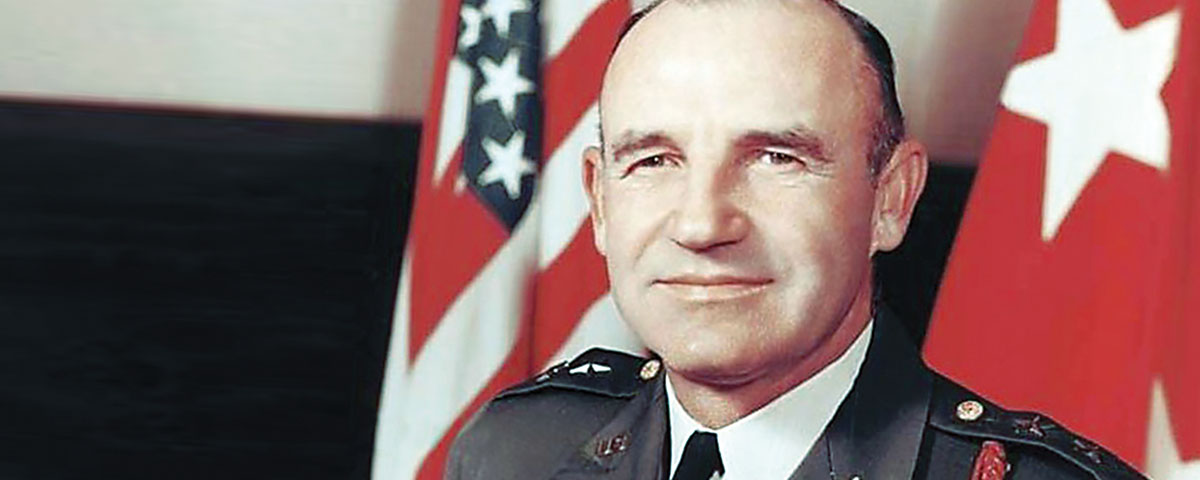Audie Murphy was the most decorated U.S. soldier of World War II, having received more than two dozen awards, including the Medal of Honor, over his two years of combat. His war memoir, To Hell and Back, and a subsequent film career made him internationally famous. Another American soldier, George Mabry, also saw hard combat in Europe and, while hardly a household name, certainly distinguished himself among the 8 million–man U.S. Army of World War II. Indeed, by some measures he was the second most decorated soldier of the war.
Born in 1917, George Lafayette Mabry Jr. was raised in Sumter County, S.C. The active teen balked at attending college until his father put him to work as a supervisor on the family farm. Attending Presbyterian College on a baseball scholarship, Mabry also served in the school’s Reserve Officer Training Corps. Though he had a contract to play semipro baseball on graduation in 1940, he instead accepted a commission as a second lieutenant. With war on the horizon, Mabry was assigned to the newly activated 4th Infantry Division, then training at Fort Benning, Ga. As the division polished its skills on maneuvers over the next several years, the shavetail rose to become a captain in the 2nd Battalion, 8th Infantry.
The 4th ID deployed to England in January 1944, and Mabry was in the first wave of soldiers ashore at Utah Beach in Normandy on June 6. Though he’d never been in combat, the young captain unhesitatingly led the attack on his unit’s objective, charging through a German minefield and point-blank small-arms fire, personally killing several enemy soldiers and capturing some 20 others. For his extraordinary heroism under fire, Mabry received the Distinguished Service Cross.
Less than three weeks later, during the drive to seize Cherbourg, 4th ID soldiers came under small-arms and artillery fire from a German strongpoint at a road junction. Mabry organized a counterattack and personally led the storming of the strongpoint. For that action he earned the Silver Star and promotion to major.
By September the 8th Infantry was embroiled in the fight to break through the Siegfried Line. Amid the efforts to dislodge the Germans, Mabry crawled forward to pinpoint a machine-gun nest and then radioed for artillery fire. The initial rounds struck dangerously close, but Mabry adjusted fire until the enemy position was destroyed. He received the Bronze Star for his grit.
On November 18 the 27-year-old major assumed command of the 2nd Battalion. Two days later he spearheaded an attack into the Hürtgen Forest near Schevenhütte, Germany. Moving ahead of his scouts, Mabry again found a path through a German minefield. Cutting his way through wire defenses, he captured three Germans and then assaulted three enemy bunkers in turn. Rushed by nine Germans, he knocked down one with his rifle butt and bayoneted another before help arrived. Mabry captured six more enemy soldiers, then led the battalion across 300 yards of fire-swept terrain to seize the high ground. There he set up a defensive position from which to pin down the enemy. This time his superlative courage earned Mabry the Medal of Honor.
Mabry finished the war as a lieutenant colonel. During his year under fire in Normandy, Northern France, Belgium, Luxembourg and Germany he had risen from company captain to battalion commander. In addition to his multiple awards for combat valor, Mabry also received the Purple Heart, while the British government awarded him its Distinguished Service Order.
At war’s end the onetime minor league baseball prospect decided to make the Army a career. Over the next three decades he took on assignments in places as far ranging as postwar Korea, Vietnam and the Panama Canal Zone. Mabry retired as a major general in 1975 and died in his home state of South Carolina in 1990 at age 72.





